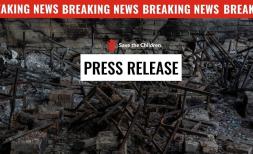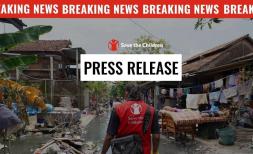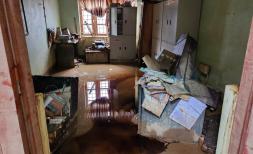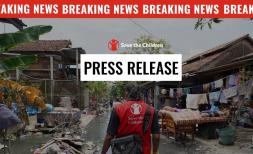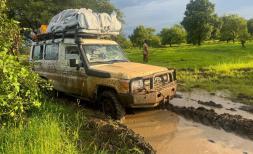Cyclone Idai: Children talk of death & destruction while world looks away
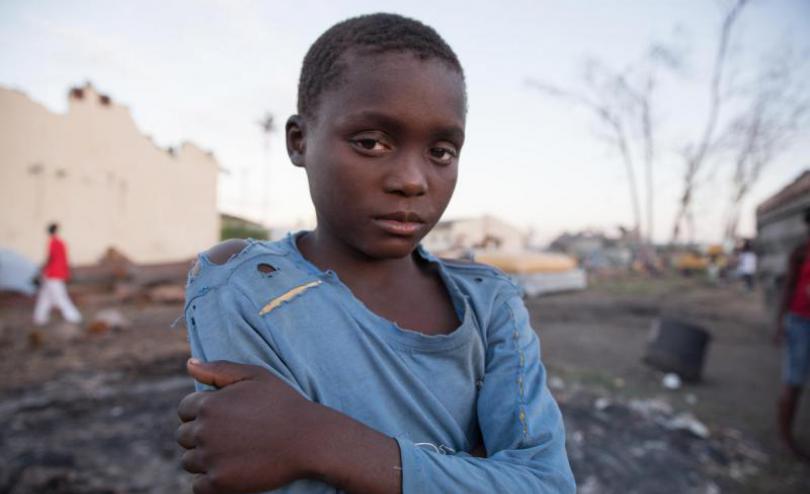
One month after Cyclone Idai wreaked havoc across Mozambique, affected children are showing signs of severe psychological stress, including bedwetting, nightmares and anxiety, Save the Children warned today. The agency is concerned the urgent and long-term needs of children continue to grow as international attention moves on from the humanitarian crisis.
Save the Children consulted children and their families on their experiences during and after the cyclone, in one of the temporary settlements in the port city of Beira. The children were asked to draw their homes before and after the cyclone and describe what they had seen.
All interviewed families spoke of losing their homes and possessions in the storm, and many saw people killed or injured. Several parents spoke of their children becoming more clingy, or more aggressive following their ordeal.
Ines, 11, was separated from her two brothers and her father when Cyclone Idai swept through her community in Buzi, one of the worst-hit areas in Mozambique. Her father was hit on his back and his neck when their house collapsed, and she was separated from her brothers when she climbed aboard a rescue boat. She hasn’t seen any of them since.
Ines drew a picture with people dead and drowning in flood waters, surrounded by broken trees.
“If people didn’t hold each other’s hands, they’d fall in the water. I nearly fell down in a lagoon, then my aunty grabbed me. I held her handbag. We went to another neighbour’s house. When we arrived there, I fell down. And then I started saying “Help! Help! Help! Help!”
Faizal, 10, drew his house before the cyclone as a colourful, warm space which he shared with his family. His drawing of his house during the cyclone is a grim, colourless picture with a person being decapitated by a corrugated iron sheet.
Regina, 29, mother of Belinha, 6, said: “The children have changed. Sometimes they will get angry, sometimes they keep asking how we will get back. It's a war for them. My 6-year-old is wetting the bed much more since the cyclone.”
Cyclone Idai made landfall in Beira on 14 March, destroying, houses, schools, warehouses and crops in its path, ripping through the daily lives of children. Close to 1 million children were affected and many are now living in tents, schools or in temporary settlements, with limited access to clean water or sanitation.
Maria Waade, Save the Children’s Mental Health and Psychosocial Support Specialist in Mozambique, said: “We are extremely concerned about the long-term wellbeing for the children in the aftermath of this devastating cyclone. Seeing everything you love and know being destroyed in the blink of an eye is a horrific experience that no child should have to live through, and the impact will be felt by children long after the floodwaters recede.
“Many children we have spoken to have seen their parents or siblings swept away by the floods or have witnessed their homes crumble around them. One girl we met saw her mother for the last time as she was pushing her onto a roof for safety. Her mother didn’t make it. These stories are frighteningly common, and this consultation shows that beyond rebuilding homes and livelihoods, we also need to focus on making sure children and their families receive the mental health support they need to recover from these experiences.
Save the Children has been on the ground in Mozambique since before the cyclone struck and is rolling out a child protection and psychosocial support program, in addition to providing emergency shelter, food and healthcare. As part of this, the agency has set up Child Friendly Spaces in and around Beira and will open up to 50 more spaces in the coming weeks. It is also helping children resume their education and is running Mobile Health Clinics to reach vulnerable children in remote areas.
The Child Friendly Spaces give children a place to play, learn, express themselves and interact with other children under the supervision of trained staff. They are a first and important step towards helping children recover, and the staff are trained to recognise signs of distress that require referral to a specialist for further assessment and treatment. Save the Children has also been supporting parents or caregivers in supporting children who suffer from stress.
Save the Children’s Response Team Leader, Machiel Pouw, said: “Children in the path of the cyclone have had their lives torn apart, they now deserve to remain in the eye of the world. While they need support with food and with rebuilding their schools and houses, the children and their families also need our long term commitment to help them recover from their experiences. After a disaster of this scale, the world must not look away.”
Notes to the editors:
- For the consultation, Save the Children held in-depth conversations spoke with 15 parents in a center for internally displaced people in Beira, asking them a series of questions about their children’s wellbeing before and after the cyclone. As part of the same consultation Save the Children staff asked over 100 children to draw memories of their homes before the cyclone, and some 40 children to also draw their homes during or after the storm. Under the supervision of Save the Children staff, a team spoke in depth with three children about their experiences and why they drew certain pictures.
- Save the Children has been working in Mozambique since 1986 and was already present in most of the areas where cyclone Idai hit. That made it possible to respond to the crisis quickly. Save the Children has been working in a consortium with CARE and Oxfam, called COSACA, since 2007. The consortium is responding to this crisis in close coordination, also with the government, making the aid more efficient and cost effective.
- Since Cyclone Idai struck, Save the Children has reached 39,455 individuals – it set up 6 child friendly spaces and 6 temporary learning spaces. Also, Save the Children distributed shelter and hygiene kits to some 2250 families across three provinces, the kits containing blanket, tents, mosquito nets, buckets. It supports the establishment of one cholera treatment centre. Emergency teams on the ground are working closely with the government and national agencies to ensure rapid outreach of people in need.
